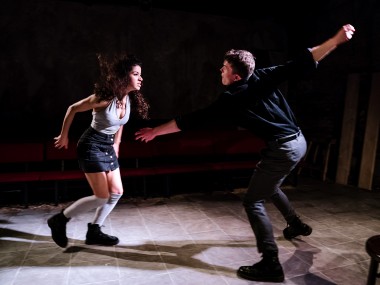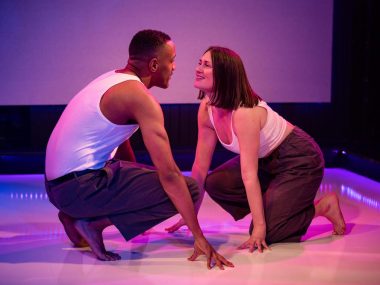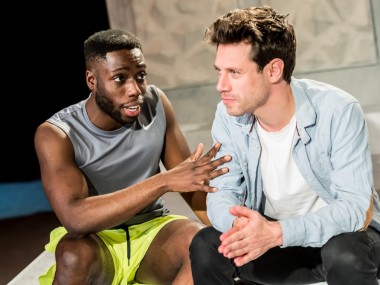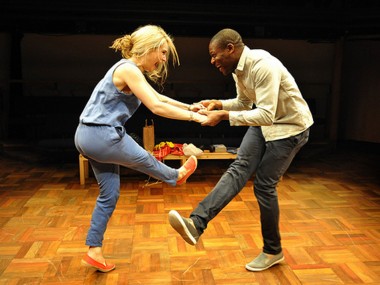Four Play, King’s Head Theatre
Tuesday 29th July 2025
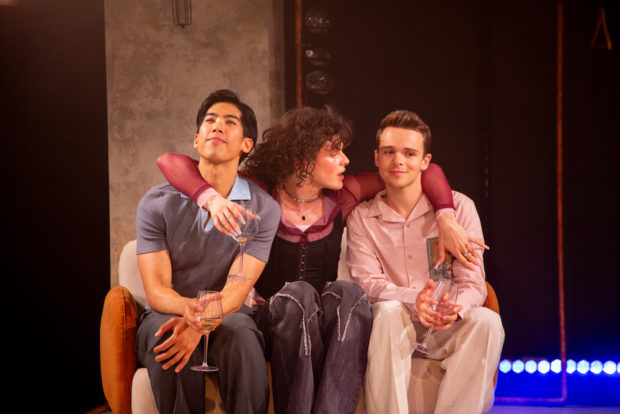
Is there such a thing as the seven-year itch? Named after Billy Wilder’s 1955 comedy, which starred Marilyn Monroe and Tom Ewell, in which a psychiatrist argues that almost all men need to have extra-marital affairs after seven years of marriage, this imaginary syndrome has enormous comic potential — not least because it implies intimate questions about fidelity and desire. In 2015, Jake Brunger — now known mainly as the lyricist of musicals such as The Great British Bake Off and The Secret Diary of Adrian Mole Aged 13 ¾ — wrote Four Play, which tackles the itch in a gay context.
First developed as part of the Old Vic New Voices Festival, and subsequently revived several times, the play begins by introducing Rafe and Pete, a monogamous gay couple who have been together for, wait for it, seven and a half years. But while Rafe is contented with their relationship, Pete would like to have sex with other people. You can see his point: the two men were virgins when they first met and came out at university, and Pete has the sense that he has missed out on sexual experimentation. Rafe agrees that both of them should try someone else, and they choose their casual hunky friend Michael for a one-off individual sex session each.
Both Rafe and Pete know that Michael lives with Andy, a partner who uses they/them pronouns, and all three agree to keep their sexual experiment secret from everybody, including Andy. After all, Michael and Andy are in an open relationship so there should be no problem. But there is. One of the rules of this openness is that each of the men tells the other about their sexual encounters, which should be one-offs and not involve any of their friends. So inevitably Michael tells Andy about what he did with Rafe and Pete, and this triggers a highly emotive conflict which exposes the problems in the relationships of both couples.
Four Play is written as a smart comedy of gay manners which gradually digs a bit deeper to explore the ethics of deceit and concealment. It shows how hard it is to be completely honest even in deeply trusting relationships because being truthful to your desires also exposes you to, at best, ridicule, and, at worst, hostility. Brunger suggests that our sexual desires change over time, and that it can be hard to know when this has happened, and then find the right time to tell your partner. The fluidity of desire and curiosity about the sexual partners you imagine might please you can be potentially fulfilling, but is also dangerous.
While Brunger is unable to say much about why some people are content with being monogamous and others yearn to experiment, he does show the strong emotional impact of deception. What’s missing, however, is any deep account of sexual pleasure, despite a perfunctory nod towards the appeal of young flesh. As expected, the fantasy of an open sexual relationship is exposed as based on untruths, and none of the characters escape unscathed from their encounters. At the same time, the writing has some gloriously comic moments, especially during the passionate showdowns with Andy. The clash between the bright jokes and the exposed vulnerabilities of the characters is beautifully imagined.
In fact, I love the humour of the piece, the jokes about KPMG — one of the big four global accountancy companies — and about Hanya Yanagihara’s A Little Life; about Ottolenghi cookbooks, and all the stuff of metropolitan living. And there’s a brilliant moment when Michael says, “Monogamy scares me” — to which an aghast Andy replies, “Spiders are scary. Terrorists are scary. Cancer is really scary. Monogamy?” Yes, this needs good comic timing to work. And here it gets it, and it does. But at the heart, if not lower down, of the play there’s also a sense of quest, a tentative and complex desire to explore sexual feelings. So although the play ends on a rather idealistic note, avoiding the most obvious damage inflicted by the characters on each other, it offers other satisfactions along the way.
Especially in this version. Jack Sain directed the original Old Vic Four Play, and he now returns with a suitably high-definition version, with superb original music by Benedict Cork, Peiyao Wang’s versatile set and Daniel Carter-Brennan’s vivid lighting. From the eye-catching start, which features huge yoga balls, through some wonderfully awkward meeting scenes and more intimate encounters, the cast performs convincingly: Lewis Cornay’s Rafe and Zheng Xi Yong’s Pete look like a perfect couple, though gradually the former’s vulnerability and the latter determination come through in a story which includes an interesting class aspect.
Similarly, Daniel Bravo’s hot Michael and wonderful Jo Foster’s non-binary Andy are well matched, with the former’s cool detachment covering his fear of commitment, while the latter’s charm turns to rage and resentment in a dramatic climax. Performed in the subterranean depths of the King’s Head Theatre, which moved from its original pub venue about 18 months ago and now has a main space which seats more than 200 people, this is an excellent fun evening which also raises uncomfortable questions about sexual desire and honesty in a clear and frank way. The seven-year itch is a myth, but this play is a contemporary classic.
This review first appeared on The Theatre Times

